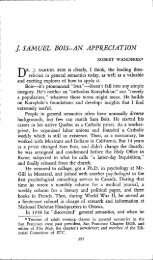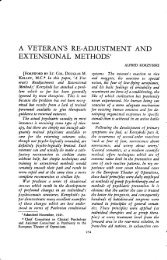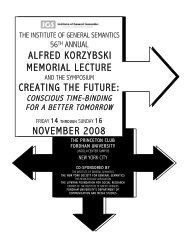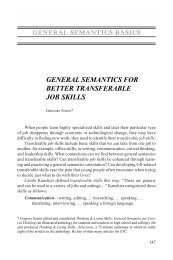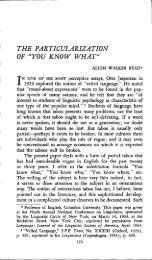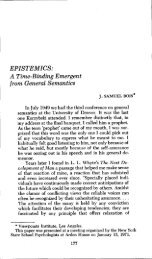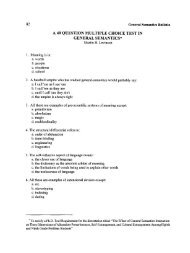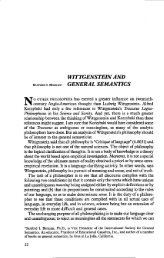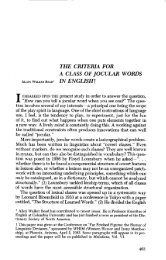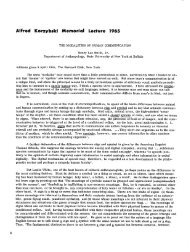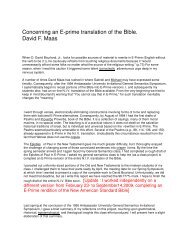Winter - The Institute of General Semantics
Winter - The Institute of General Semantics
Winter - The Institute of General Semantics
Create successful ePaper yourself
Turn your PDF publications into a flip-book with our unique Google optimized e-Paper software.
TIME-BINDINGS<br />
Vol. XXII, No. 4, <strong>Winter</strong> 2004-2005<br />
Table <strong>of</strong> Contents<br />
Editor’s Perspectives....................................1<br />
Building Bridges - <strong>The</strong> Fabulous Mystery<br />
<strong>of</strong> Language (IV)............................................1<br />
A Recipe for Time-Binding............................. 3<br />
Some GS Election Lessons............................. 5<br />
<strong>The</strong> Map Is Not <strong>The</strong> Territory........................ 5<br />
Australian <strong>General</strong> <strong>Semantics</strong> Society........... 5<br />
New York Society Report............................... 6<br />
San Francisco Society Report........................ 6<br />
Reflections on Flip-Flopping......................... 6<br />
Polish On <strong>The</strong> Golden Rule........................... 7<br />
IGS Capital Campaign...................................7<br />
Exciting Upcoming IGS Events......................8<br />
©2005 <strong>Institute</strong> <strong>of</strong> <strong>General</strong> <strong>Semantics</strong><br />
TIME-BINDINGS<br />
An IGS Newsletter<br />
Susan Presby Kodish: Editor<br />
Bruce I. Kodish: Editorial Assistant<br />
<strong>Institute</strong> <strong>of</strong> <strong>General</strong> <strong>Semantics</strong><br />
P.O. Box 1565<br />
Fort Worth,TX 76101<br />
Phone: 817-886-3746<br />
Email: igs@time-binding.org<br />
www.time-binding.org<br />
Submission Guidelines<br />
Please send hard-copy submissions or inquiries<br />
to Susan Presby Kodish at: 330<br />
Cordova St. # 178, Pasadena, CA 91101-<br />
4654; Fax 626-795-0954. In addition to<br />
hard-copy, whenever possible send your<br />
article submission via internet by copying<br />
your text into the body <strong>of</strong> an email<br />
to: timebindings@aol.com. Email attachments<br />
will not be accepted.<br />
Deadlines: Spring—March 1; Summer—<br />
June 1; Fall—September 1; <strong>Winter</strong>—December<br />
1.<br />
PERSPECTIVES<br />
FROM THE EDITOR<br />
How’s this for problem-solving flexibility?<br />
As reported in the New York<br />
Times (October 26, 2004, D5): In the<br />
emergency room lay a patient having<br />
continuous convulsions; the immediate<br />
cause seemed to be electrical<br />
misfirings due to a low pulse rate<br />
resulting in an insufficient blood supply<br />
to the brain. Needing to do something<br />
quickly, an intern used an external<br />
pacemaker; due to the patient’s<br />
thick chest wall, maximum voltage<br />
was needed. This “worked,” in that<br />
the man’s heart rate became acceptable.<br />
However, the high voltage had<br />
created a new, terrible pain in his<br />
chest.<br />
What to do? <strong>The</strong> intern called in a<br />
senior surgical resident and the two<br />
pondered the question <strong>of</strong> how to fix<br />
an electrical problem that no electrician<br />
could work on.<br />
<strong>The</strong>ir solution? In a hardware store,<br />
the intern purchased chicken wire<br />
and lamp cord (subsequently sterilized).<br />
<strong>The</strong> surgeon put the chicken<br />
wire in the man’s chest, attached the<br />
lamp-cord wires to it, and attached<br />
the other end <strong>of</strong> the wires to the external<br />
pacemaker. This allowed for a<br />
very low voltage to normalize the<br />
man’s heart rate, with no pain in his<br />
chest wall.<br />
My first reaction on reading this was<br />
awe: “Wow! How extraordinary.”<br />
And yet I realized that such solutions<br />
need not be so unusual. We each have<br />
the possibility to do what they did—<br />
to step outside <strong>of</strong> intensional category<br />
designations and into an extensional<br />
consideration <strong>of</strong> what is<br />
functionally needed in a given situation.<br />
I plan to practice this approach<br />
more <strong>of</strong>ten, finding out-<strong>of</strong>-the-ordinary<br />
ways <strong>of</strong> solving even those<br />
problems that can be solved in more<br />
ordinary ways.Will you join me in<br />
this endeavor?<br />
For now,<br />
Susan Presby Kodish<br />
BUILDING BRIDGES<br />
BY LAURA BERTONE<br />
THE FABULOUS MYSTERY OF<br />
LANGUAGE (PART IV)<br />
(OR HOW TO GO BEYOND<br />
SOME OF ITS POSSIBLE<br />
TRAPS)<br />
In the introduction to this set <strong>of</strong> columns<br />
on “<strong>The</strong> Fabulous Mystery <strong>of</strong><br />
Language,” I wrote that our perceptions<br />
<strong>of</strong> language vary and expand according<br />
to our purposes in using it.<br />
As general-semanticists we have<br />
been trained to become aware <strong>of</strong> certain<br />
uses and dimensions <strong>of</strong> language<br />
that most non-general-semanticists<br />
are not aware <strong>of</strong>. As speakers or writers,<br />
as native-language teachers or<br />
teachers <strong>of</strong> foreign languages, we are<br />
trained to become aware <strong>of</strong> many<br />
other and incredibly varied aspects<br />
and dimensions <strong>of</strong> language (phonological,<br />
morphological, syntactic, semantic,<br />
pragmatical rules, etc.).
♦ 2 ♦ <strong>Winter</strong> 2004-2005 TIME-BINDINGS<br />
Mark Your Calendas<br />
• Alfred Korzybski Memorial Lecture , April<br />
22, 2005 at the American Museum <strong>of</strong> Natural<br />
History, New York City. Scheduled<br />
speaker, Robert Carneiro (Anthropologist at<br />
the American Museum <strong>of</strong> Natural History<br />
& Columbia University). To be followed by<br />
April 23 Symposium.<br />
• IGS Seminar-Workshop, July 11-17, 2005,<br />
at Alverno College in Milwaukee, WI. Open<br />
to anyone wishing to experience a week-long<br />
immersion in general semantics.<br />
• IGS Brief Seminar, July 15-17 at Alverno<br />
College. For those who can’t spend the full<br />
week at Alverno, we’re <strong>of</strong>fering an abbreviated<br />
‘capstone’ program weekend which you<br />
can attend separately.<br />
• Read House Dedication, September 23-<br />
25, 2005, in Fort Worth. Help us dedicate<br />
the new home <strong>of</strong> the <strong>Institute</strong> <strong>of</strong> <strong>General</strong> <strong>Semantics</strong>.<br />
• GS Teaching Conference, October 27-29,<br />
2005, in Las Vegas, NV.<br />
Other GS Organizations<br />
Australian <strong>General</strong> <strong>Semantics</strong> Society: c/o<br />
Laurence Cox, Unit 15, “<strong>The</strong> Commodore,”<br />
12-16 Walton Crescent, Abbotsford,<br />
2046, N.S.W., Australia<br />
New York Society for <strong>General</strong> <strong>Semantics</strong>:<br />
c/o Allen Flagg, 144 East 36th St., New<br />
York, NY 10016 Phone: 212-532-8042<br />
San Francisco Society for <strong>General</strong> <strong>Semantics</strong><br />
248 Alma St., San Francisco, CA 94117-<br />
4224. Contact Jeremy Klein at 415-724-7131<br />
or ling<strong>of</strong>rame@aol.com<br />
For general-semantics related links go to<br />
www.time-binding.org/library.htm<br />
Genius begins great works;<br />
labor alone finishes them.<br />
— Joseph Joubert<br />
As researchers in the language field,<br />
we are confronted with other fascinating<br />
aspects. As psychologists and<br />
psychoanalysts know, the realm <strong>of</strong><br />
words unveils unsuspected human<br />
characteristics, patterns and behaviors.<br />
As the pr<strong>of</strong>essional interpreter I<br />
was—having acted as such for over<br />
25 years mostly in Europe—there are<br />
still some other characteristics I<br />
learned to detect. For instance, the<br />
possible presence <strong>of</strong> divergent or<br />
contradictory signals in speech.<br />
In my last two columns, we dealt<br />
with the possibility—awesomeseeming<br />
at first—that it may be possible<br />
in certain cases to assert something<br />
and then its opposite, and contend<br />
that both are valid without going<br />
beyond the realms and boundaries<br />
<strong>of</strong> sanity.<br />
We will now take an extreme case <strong>of</strong><br />
discourse wherein we can detect contradiction,<br />
not through the linear development<br />
<strong>of</strong> the content itself, but<br />
rather through the comparison <strong>of</strong><br />
what the speaker simultaneously says<br />
and does.<br />
<strong>The</strong> case is taken from a UNESCO<br />
Conference on “intercultural matters”<br />
held in Paris in the eighties,<br />
during which an <strong>of</strong>ficer enthusiastically<br />
defended the need <strong>of</strong> all nations<br />
to protect their native features and the<br />
right <strong>of</strong> peoples to preserve their own<br />
language and civilization. Excited by<br />
the ideas he believed he was unabashedly<br />
defending, this South<br />
American got carried away by his<br />
own loquacity without realizing that,<br />
by speaking French—while his<br />
mother tongue was Spanish and<br />
while simultaneous interpretation<br />
was being provided—he was canceling<br />
out his statement, at least in part.<br />
If his speech had a perfectly good internal<br />
logic, the juxtaposition <strong>of</strong> the<br />
context with the fact that he was<br />
speaking a language other than his<br />
own revealed a lack <strong>of</strong> consistency.<br />
<strong>The</strong> perception <strong>of</strong> the whole (content<br />
plus circumstances <strong>of</strong> enunciation)<br />
can certainly partially modify understanding,<br />
or globally transform the<br />
effects a speech can produce.<br />
If A says “x,” we think A believes in<br />
“x,” but if A says “x” while doing<br />
“z” and it turns out that “z” is different<br />
from (and in some cases even<br />
opposed to) “x”—z≠x—we must<br />
conclude that:<br />
1) A does not believe in “x” but wants<br />
us to believe he does;<br />
2) A believes in “x” only in certain<br />
unspecified circumstances;<br />
3) A believes in “x” but only for others<br />
and not for himself, which brings<br />
in the question <strong>of</strong> finding out why A<br />
uses a different set <strong>of</strong> criteria for himself;<br />
and<br />
4) A is unaware <strong>of</strong> his own inconsistency<br />
or is betting that it will go unnoticed.<br />
In either case, attention must<br />
be redoubled.<br />
<strong>The</strong> contradiction here must not be<br />
sought in the content <strong>of</strong> the statement<br />
itself but in the conflict between<br />
whatever is enunciated and the situation<br />
<strong>of</strong> enunciation itself. If there is<br />
a contradiction between what a person<br />
says and what he (or she) does at<br />
the moment <strong>of</strong> the enunciation, his<br />
statements will lose force and his<br />
credibility must be questioned.<br />
This kind <strong>of</strong> contradictory situation,<br />
wherein the speaker is doing exactly<br />
what he says should not be done, is<br />
<strong>of</strong>ten the substance <strong>of</strong> jokes, such as<br />
we find in some comic strips where<br />
a dissenting writer explains the rea-
TIME-BINDINGS <strong>Winter</strong> 2004-2005 ♦ 3 ♦<br />
sons for refusing to appear on television,<br />
while presenting his new<br />
book, “Rejection <strong>of</strong> the Media,” on<br />
television!<br />
Of course, as we know from Gregory<br />
Bateson’s studies on “double binds,”<br />
there are some much more dramatic<br />
cases. This contradiction <strong>of</strong> signals<br />
<strong>of</strong> different types creates ambiguity<br />
and mistrust when we can see<br />
through it and are the speaker’s peers,<br />
but its effects can be devastating in<br />
situations <strong>of</strong> dependency and/or<br />
when we do not perceive the process<br />
with enough clarity. If a father says<br />
to his son, “Don’t swear, damn it!”<br />
the father’s friends may find the situation<br />
ridiculous and somewhat funny,<br />
and perhaps laugh; the son, however,<br />
will feel the impotence <strong>of</strong> confusion<br />
and dependence.<br />
Contradiction reaches its highest<br />
point, and duplicity its worst expression,<br />
in examples such as, “Let me<br />
help you become independent,” or “I<br />
order you to disobey me,” wherein<br />
parents (or other authorities) seem to<br />
block all exits, even the emergency<br />
ones.<br />
<strong>The</strong> important thing to observe here<br />
is that in order to detect the collision<br />
<strong>of</strong> signals, it is imperative to have<br />
perceived, found or created a<br />
“whole” encompassing as many elements<br />
as possible. And this “whole”<br />
frame <strong>of</strong> reference should be flexible—open<br />
to more elements and restructuring<br />
if necessary.<br />
A change in our frame <strong>of</strong> reference<br />
was what enabled us to accept as<br />
valid both “the sun obeys my syntax,”<br />
and “the sun does not obey my<br />
syntax.” In the most dramatic cases,<br />
a change in the frame <strong>of</strong> reference<br />
or the level <strong>of</strong> abstraction (putting the<br />
conflicting father-son relationship in<br />
a wider context, for example) may<br />
allow the son to break free: by recognizing<br />
and accepting the limitations<br />
<strong>of</strong> the restrictive family situation<br />
he finds himself in, he can transcend<br />
it, thus becoming the winner<br />
<strong>of</strong> a previously seemingly-impossible<br />
victory.<br />
Can a greater awareness <strong>of</strong> what<br />
language use involves allow us to<br />
go beyond some <strong>of</strong> the traps it lays?<br />
I am confident it can. But what a<br />
paradox: bridge and barrier at the<br />
same time!<br />
A RECIPE FOR TIME-BINDING<br />
BY JACKIE RUDIG<br />
Thanks to general semantics, my<br />
Grandmother’s recipe has apparently<br />
garnered national (perhaps, international)<br />
attention. Susan Kodish<br />
emailed me all the way from California<br />
with questions about the Summer<br />
2004 Alverno College seminarworkshop.<br />
She was curious about the<br />
“to-do”created by my presentation —<br />
and what “cookies” have to do with it.<br />
<strong>The</strong> hoopla had humble beginnings:<br />
Each participant drew a GS formulation<br />
from a cup to determine which<br />
topic he or she would informally<br />
present to the class at the end <strong>of</strong> the<br />
week. Students were instructed to focus<br />
on an example/demonstration/application<br />
<strong>of</strong> their assigned topic (the thing)<br />
rather than on the definition (the word).<br />
I smiled when the slip I drew read<br />
“Time-Binding.” <strong>The</strong> topic seemed<br />
particularly appropriate for me: My<br />
daughter’s “due date” had come and<br />
gone, and at any moment, I might<br />
become a Grandma again.<br />
To prepare for my “fifteen minutes<br />
<strong>of</strong> fame,” I checked my notes,<br />
browsed through some GS books,<br />
and conferred with Milton Dawes. I<br />
decided to present my evaluation <strong>of</strong><br />
Alfred Korzybski’s <strong>The</strong>ory <strong>of</strong> Time-<br />
Binding as the uniquely human ability<br />
to use symbols and symbol systems<br />
to accumulate, improve, and<br />
pass on information from one generation<br />
to the next. My Grandma’s<br />
cookie recipe, I thought, might be one<br />
interesting way to illustrate the theory.<br />
I explained to the group how<br />
Grandma Jacobson immigrated from<br />
Morgongava, Sweden in 1901 and<br />
among her few possessions, was her<br />
mother’s recipe for oatmeal cookies.<br />
Eventually, the handwritten card<br />
passed to my mother, who decided<br />
to improve the taste and texture <strong>of</strong><br />
the cookies by adding raisins to the<br />
batter. About 30 years later, my sister,<br />
Laura, became custodian <strong>of</strong> the<br />
card. Since then, Laura has chosen<br />
to improve the nutritional value by<br />
reducing the measures <strong>of</strong> sugar and<br />
butter called for in the original recipe.<br />
Time-binding on Grandma’s recipe, I<br />
emphasized to the group, occurred (at<br />
least) two times: when Mom made<br />
Grandma’s cookies “tastier,” and when<br />
Laura made Mom’s cookies “healthier.”<br />
This simple but clear illustration (tome-at-that-time)<br />
<strong>of</strong> effective time-binding<br />
appeared to be well-received by my<br />
fellow classmates—as were the freshly<br />
baked samples <strong>of</strong> the cookies I had<br />
brought to share.<br />
My self-assurance, however, would<br />
not last for long. Steve Stockdale
♦ 4 ♦ <strong>Winter</strong> 2004-2005 TIME-BINDINGS<br />
quickly clarified that, yes, time-binding<br />
concerned “building upon and<br />
passing accumulated information<br />
from one generation to the next,” but<br />
this process does not necessarily<br />
mean that improvement always occurs.<br />
Milton Dawes quietly said, “Not so,”<br />
and briefly explained that Korzybski<br />
frequently linked words such as “improvement,<br />
progress, human advancement,<br />
human development,<br />
self-improvement, refinement, betterment,<br />
benefit, etc.” with his timebinding<br />
theory.<br />
One <strong>of</strong> the more feisty students<br />
chimed in with, “A lot <strong>of</strong> people<br />
don’t like raisins, you know. Adding<br />
raisins wouldn’t be improvement to<br />
them.” <strong>The</strong>n one <strong>of</strong> the thinner students<br />
said, “But reducing fat and<br />
sugar in any recipe ‘always’ improves<br />
it.” One <strong>of</strong> the European participants<br />
suggested that time-binding<br />
without “improvement” might be<br />
merely a version <strong>of</strong> space-binding.<br />
Our guest <strong>of</strong> the day, Abdul Salaam,<br />
said he was unaware that the idea <strong>of</strong><br />
progress/improvement was inherent<br />
to time-binding.<br />
So I started to ask Milton to show<br />
the group the passages from Science<br />
and Sanity he had looked up the night<br />
before—the passages he had shared<br />
with me and that supported “our”<br />
point <strong>of</strong> view. But Andrea Johnson,<br />
the quintessential teacher, interposed<br />
by commenting how time-binding<br />
might be a very interesting subject for<br />
many <strong>of</strong> us to investigate further. <strong>The</strong>n<br />
she suggested we break for lunch.<br />
When Milton returned to Montreal,<br />
he reread both Science and Sanity<br />
and Manhood <strong>of</strong> Humanity. He continues<br />
to evaluate time-binding as a<br />
mechanism for “improving” the information<br />
passed from generation to<br />
generation (interpersonal), as well as<br />
a means for self-improvement when<br />
individuals build upon their personal<br />
knowledge (intrapersonal). We are all<br />
time-binders, he reminds us, and the<br />
conscientious practice <strong>of</strong> general semantics<br />
can help us become more<br />
conscious time-binders. To provoke<br />
thought and promote study <strong>of</strong><br />
korzybskian time-binding, Milton<br />
has recently prepared a list <strong>of</strong> observations<br />
and questions based on his<br />
readings (yours for the asking).<br />
<strong>The</strong> Australian <strong>General</strong> <strong>Semantics</strong><br />
Society heard about the controversy<br />
that began at Alverno and decided<br />
they would like something “to do”<br />
with it, also. <strong>The</strong>y plan to discuss the<br />
function and purpose <strong>of</strong> time-binding<br />
as it relates to “change” in their<br />
upcoming Tuesday night meetings in<br />
Sydney. Perhaps they will be generous<br />
enough to share their points <strong>of</strong><br />
view.<br />
Susan and Bruce Kodish are probably<br />
having a few discussions <strong>of</strong> their<br />
own in Pasadena. One <strong>of</strong> them thinks<br />
(as-<strong>of</strong>-now-and-in-part) that timebinding<br />
involves “possibilities, not<br />
necessities,” while admitting that<br />
“the more I write, the more complicated<br />
the issue <strong>of</strong> time-binding gets.”<br />
<strong>The</strong> other Kodish defers to Milton’s<br />
“correct judgment” and adds,<br />
“Whether or not time-binding implies<br />
improvement should not depend<br />
on anyone’s opinion, but rather<br />
on consultation <strong>of</strong> the original source<br />
and an analysis <strong>of</strong> the term’s implication.”<br />
Andrea made plans to gain some<br />
“fresh perspectives” on time-binding<br />
by presenting the topic to her new<br />
GS students in Milwaukee, including<br />
Milton’s latest observations and<br />
comments.<br />
As for Fort Worth—I will bet my<br />
copy <strong>of</strong> Pula’s Guide for the Perplexed<br />
that Steve places the subject<br />
<strong>of</strong> time-binding on the agenda for any<br />
IGS teacher training meeting.<br />
Alfred Korzybski built upon Aristotelian<br />
premises to develop “better”<br />
guidelines for thinking-feeling-behaving,<br />
and his improved system—<br />
general semantics— is built upon the<br />
idea that we are the time-binding<br />
class <strong>of</strong> life. Korzybski would expect<br />
present-day general-semanticists (especially<br />
its scholars and teachers) to<br />
build upon that “civilizing energy”<br />
and to time-bind on his original theories.<br />
However, I think he would also<br />
expect the ensuing inferences to<br />
“converge” more <strong>of</strong>ten than “diverge,”<br />
and that ‘relative invariance’<br />
be acknowledged <strong>of</strong>ten enough so<br />
that his fundamental concepts and<br />
principles would remain reasonably<br />
intact for future time-binders.<br />
I can wonder whether my newborn<br />
granddaughter will inherit my apathy,<br />
or her mother’s zeal, for baking;<br />
and I can speculate about ways she<br />
may (or may not) change the family<br />
recipe someday. <strong>The</strong>se thoughts, I<br />
suppose, might represent some level<br />
<strong>of</strong> time-binding, but hardly do justice<br />
to its potentialities.<br />
For me at this moment, time-binding<br />
includes becoming more conscious<br />
<strong>of</strong> abstracting; the “nature” <strong>of</strong><br />
our ethical responsibilities toward the<br />
improvement <strong>of</strong> time and place for<br />
ourselves and others. This presumed<br />
liability for “interconnectedness” far<br />
surpasses the notion <strong>of</strong> “passing on<br />
information”—like a recipe—from<br />
one generation to the next.
TIME-BINDINGS <strong>Winter</strong> 2004-2005 ♦ 5 ♦<br />
I am relatively new to general semantics,<br />
but aware enough <strong>of</strong> its formulations<br />
to realize that no two thinkers<br />
will evaluate time-binding (or<br />
anything else) in the “same” way. Yet<br />
when I encounter difficulty grasping<br />
some <strong>of</strong> the more complex theories<br />
and principles, I still want to look to<br />
GS teachers and mentors for guidance.<br />
It is important to me—and essential<br />
to what Korzybski called<br />
time-binding excellence—that current<br />
and future students and practitioners<br />
<strong>of</strong> general semantics who<br />
want to “see farther” will not need<br />
to wonder which “shoulders” to stand<br />
on.<br />
[Editor’s Note: See the editorial “<strong>The</strong><br />
Extensional Definition <strong>of</strong> Time-<br />
Binding” (<strong>General</strong> <strong>Semantics</strong> Bulletin<br />
Number 71), by James D. French,<br />
which includes Jim’s new formulation<br />
<strong>of</strong> cross-binding, for another<br />
view. Any comments?]<br />
SOME GS ELECTION<br />
LESSONS<br />
BY ALLAN L. BROOKS<br />
I can’t help thinking that at least two<br />
groups <strong>of</strong> people involved in the last<br />
election need lessons in general semantics.<br />
One group is that <strong>of</strong> the<br />
designers <strong>of</strong> the exit poll that gave<br />
voters “moral values” as an item <strong>of</strong><br />
most concern. What an example <strong>of</strong><br />
“allness” applied to a high-order abstraction,<br />
and a need for indexing!<br />
Also, many <strong>of</strong> the voters who gave<br />
this top priority may have been guilty<br />
<strong>of</strong> elementalism, according to columnists’<br />
comments. “Moral values”<br />
were primarily associated with<br />
sexual mores. Apparently, not with<br />
the morality <strong>of</strong> the Iraq war, poverty,<br />
the environment, etc.<br />
<strong>The</strong> other group I refer to are those<br />
who voted for a gay marriage ban.<br />
Though the idea <strong>of</strong> gay marriage is<br />
shocking to many, it involves a map/<br />
territory issue. <strong>The</strong> dictionary definition<br />
as well as our millenial timebound<br />
concept <strong>of</strong> marriage is the<br />
map; but the territory is complex.<br />
Matters <strong>of</strong> property rights, parenting<br />
(even procreation, for lesbians can<br />
become pregnant) not to mention<br />
sanctioning stable, loving relationships<br />
are involved there. <strong>The</strong> territory<br />
encompasses the nearly 1000<br />
Federal laws that refer to marriage,<br />
spouse, husband or wife, etc., which<br />
prevent gay and lesbian couples from<br />
enjoying equal benefits or partner<br />
rights enjoyed by straight couples. It<br />
is unlikely that blanket laws could be<br />
written to make each <strong>of</strong> these laws<br />
apply to civil unions. We need general<br />
semanticists to articulate this<br />
word/thing aspect on the national<br />
level!<br />
THE MAP IS NOT THE<br />
TERRITORY<br />
BY FRANK GASTNER<br />
Somewhere in my younger days,<br />
someone told me about yogurt and<br />
described it. It sounded like something<br />
that should be eaten by a<br />
Kurdish goatherd, sitting in the hills,<br />
playing his pipes to his goats. I was<br />
convinced American men should not<br />
eat yogurt.<br />
<strong>The</strong>n, while staying in a guesthouse<br />
in Boston, I became quite ill. I spent<br />
an evening wearing a path in the carpet.<br />
<strong>The</strong> next day my wife suggested<br />
that I needed something for my stomach—like<br />
yogurt. I demurred. I<br />
would stay sick.<br />
At this point my wife had a better<br />
grasp <strong>of</strong> map and territory than I<br />
gave her credit for. She purchased<br />
a container <strong>of</strong> Breyers’ yogurt, borrowed<br />
a bowl and spoon from the<br />
landlady, dumped the yogurt in the<br />
bowl, mixed it up, and presented<br />
me with a bowl <strong>of</strong> blueberry pudding.<br />
She didn’t fool me. I knew what it was.<br />
But I went along with her charade and<br />
said, “O.K., I will eat this blueberry<br />
pudding if you think it will help.<br />
I liked it.<br />
I now buy and eat this concoction,<br />
enjoy it, and even call it yogurt.<br />
Anybody seen my goats?<br />
AUSTRALIAN GENERAL<br />
SEMANTICS SOCIETY<br />
BY DAVID HEWSON<br />
Most AGS activities continue as<br />
normal. Unfortunately the Monday<br />
night group has stopped meeting,<br />
after starting to study Dare to Inquire.<br />
Did this group dare too<br />
much?<br />
<strong>The</strong> Tuesday night group still meets<br />
weekly and has finished studying<br />
Science and Sanity, right to the end<br />
<strong>of</strong> Book III and Supplements, etc.<br />
We are now working on a Rational<br />
Emotive Behavior <strong>The</strong>rapy book<br />
called Choose to be Happy by Wayne<br />
Froggatt.<br />
Nearly every month we have an allday<br />
seminar on a weekend. Topics<br />
in the second half <strong>of</strong> 2004 have included:
♦ 6 ♦ <strong>Winter</strong> 2004-2005 TIME-BINDINGS<br />
♦ Terror Management <strong>The</strong>ory<br />
This seminar covered some <strong>of</strong> the<br />
causes <strong>of</strong> conflict between different<br />
cultural groups, exemplified by the 9/<br />
11 terrorist attack. <strong>The</strong> presentation<br />
was based on a new branch <strong>of</strong> psychology<br />
called Terror Management <strong>The</strong>ory.<br />
(See In the Wake <strong>of</strong> 9/11: <strong>The</strong> Psychology<br />
<strong>of</strong> Terror by Pyszczynski,<br />
Greenberg and Solomon.) <strong>The</strong> AGS<br />
seminar related this theory to GS and<br />
to students’ everyday lives.<br />
♦ Confronting the Challenges <strong>of</strong> Conflicting<br />
World Views. Looking beyond<br />
the <strong>Institute</strong>’s Conference papers, and<br />
seeing how we might understand and<br />
apply some GS principles to our global,<br />
local and personal conflicts.<br />
♦ To Live Extensionally—Venturing<br />
Beyond Mere Words. Can we free ourselves<br />
<strong>of</strong> the tyranny <strong>of</strong> misrepresentation?<br />
Why speak at all when every<br />
word can be misconstrued?<br />
♦ <strong>The</strong>“Logical Fate”Diagram. How to<br />
use the method <strong>of</strong> differential diagnosis to<br />
help diagnose and change our irrational<br />
beliefs so as to live saner and happier lives.<br />
♦ How to Apply GS in Your Everyday<br />
Life. Methods, exercises, and practice at<br />
applying relevant GS formulations to your<br />
every day life problems and situations.<br />
Some <strong>of</strong> this was based on the book <strong>The</strong><br />
Design <strong>of</strong> Everyday Things by Donald<br />
Norman which I highly recommend.<br />
In December we enjoyed a movie, followed<br />
by discussion over dinner at a<br />
nearby restaurant.<br />
We wish everyone a Happy New Year.<br />
NEW YORK SOCIETY REPORT<br />
ABSTRACTED FROM THE SOCIETY’S<br />
NEWSLETTER BY SUSAN KODISH<br />
In September, John Kiehl, an electrical<br />
engineer who has devoted himself<br />
to a career in music, presented<br />
aspects <strong>of</strong> the work <strong>of</strong> physicist<br />
Stephen Wolfram. Wolfram studied<br />
how nature produces complexity,<br />
which resulted in his formulating, as<br />
he labeled it and wrote about in his<br />
book, A New Kind <strong>of</strong> Science (2001).<br />
Kiehl plans to use this work in developing<br />
a computer music program.<br />
In October, led by Ira Bravin, Allen<br />
Flagg, Kathie Liepe-Levinson, Martin<br />
Levinson, Harry Maynard and<br />
Irene Ross-Mayper, the audience participated<br />
in upgrading general-semantics<br />
tools and techniques we can<br />
use in everyday living and learning.<br />
In November, “Socrates in Person”<br />
Ronald Gross returned by popular demand<br />
to <strong>of</strong>fer new theatrical and participatory<br />
experiences. He used<br />
the method <strong>of</strong> “Socratic Dialogue”<br />
to engage the audience on issues that<br />
matter. Gross is the author <strong>of</strong><br />
Socrates’Way: Seven Master Keys to<br />
Using Your Mind to the Utmost.”<br />
In December, Lloyd Gilden, PhD,<br />
President <strong>of</strong> the Lifwynn Foundation<br />
for Social Research, spoke about<br />
“<strong>The</strong> Role <strong>of</strong> Language in Human<br />
Social Behavior.” He described approaches<br />
that have been developed to restructure<br />
both verbal and non-verbal processes,<br />
as they have been formulated by<br />
philosophers, linguists and psychologists,<br />
to move humanity to a more adaptive<br />
level. Gilden, a neuropsychologist and<br />
former pr<strong>of</strong>essor <strong>of</strong> psychology, has a<br />
private clinical practice.<br />
SAN FRANCISCO SOCIETY<br />
REPORT<br />
ABSTRACTED FROM THE SOCIETY’S<br />
NEWSLETTER BY SUSAN KODISH<br />
In July (Assumptions We Make and<br />
How to Avoid Those that Don’t Make<br />
Sense), the group started with the<br />
Haney uncritical inference exercise<br />
about the albatross and the ship. <strong>The</strong>n<br />
participants shared problems <strong>of</strong> false assumptions<br />
they had made or heard about.<br />
In September, the group viewed and<br />
discussed the film, “Perception,”<br />
from James Burke’s series “Connections,”<br />
on PBS/KQED.<br />
In October (I’ll Be Seeing You),<br />
Michael Ponting examined the similarities<br />
and differences between seeing<br />
and believing.<br />
In November, the group discussed<br />
the election campaign, including results<br />
and prospects for the future.<br />
In December, in pre-holiday spirit, the<br />
group shared sweet and savory goodies,<br />
along with interesting bits <strong>of</strong> life with a<br />
general-semantics angle.<br />
REFLECTIONS ON FLIP-FLOPPING<br />
BY MARTIN H. LEVINSON<br />
<strong>The</strong> Republicans have accused John<br />
Kerry <strong>of</strong> being a flip-flopper. <strong>The</strong> truth is<br />
we’re all flip-floppers.Individuals change<br />
physically, mentally, and emotionally<br />
over time as new facts present themselves<br />
and new circumstances emerge. Are you<br />
the same person today that you were a<br />
year ago, five years ago, ten years ago?<br />
Do you look exactly identical? Has your<br />
behavior changed in any way? Has your<br />
thinking shifted in certain areas?<br />
It’s comforting to think that the world and<br />
the people in it are the same from day to<br />
day. It makes for easy predictability. But<br />
life is process so change must occur. Unfortunately,<br />
many seem to disregard this<br />
rule <strong>of</strong> nature.<br />
If we take a position on something, do<br />
we have to maintain that belief forever?<br />
Neil Postman, an eminent education pr<strong>of</strong>essor<br />
and prolific writer, didn’t think so.<br />
In 1979 he published a book titled Teach-
TIME-BINDINGS <strong>Winter</strong> 2004-2005 ♦ 7 ♦<br />
ing as a Conserving Activity. In the introduction<br />
to that work he wrote, “<strong>The</strong> Earth<br />
has gone around the sun twelve times<br />
since the publication <strong>of</strong> our best known<br />
book, Teaching as a Subversive Activity.<br />
I do not seem to be facing in the same<br />
direction as I was in 1967. Frankly, I do<br />
not know if I have turned or everything<br />
else has. But many <strong>of</strong> the arguments<br />
which then seemed merely opposite, now<br />
seem acutely apposite, and this book is<br />
the result <strong>of</strong> a change in perspective. It is<br />
the vice versa <strong>of</strong> that earlier book.”<br />
You are probably familiar with the cliché<br />
“consistency is a virtue.” Indeed, it <strong>of</strong>ten<br />
is. We want airline pilots to consistently<br />
be alert when they are flying us to our destinations,<br />
baseball players have to consistently<br />
get on base to bat over .300, and<br />
consistency is the hallmark <strong>of</strong> our judicial<br />
system—rulings are based on precedent.<br />
But, to paraphrase Emerson, “consistency<br />
is [also] the hobgoblin <strong>of</strong> small minds.”<br />
It can keep us from taking risks and expanding<br />
our knowledge in new areas. A<br />
foolish consistency can hinder us from<br />
seeing and making changes that might<br />
be beneficial.<br />
An important mark <strong>of</strong> maturity is the ability<br />
to distinguish when one should take a<br />
consistent approach and when one should<br />
do the obverse. Whether Kerry is following<br />
this formula appropriately I leave to<br />
political partisans, pundits, and undecided<br />
voters. But, with apologies to Barry<br />
Goldwater, I will say this, “Flip-flopping<br />
when new information demands it is no<br />
vice; staying the course in defiance <strong>of</strong><br />
evidence that you shouldn’t is no virtue.<br />
POLISH ON THE GOLDEN RULE<br />
BY ROBERT P. POTTER<br />
In a (mostly) general-semantics text I<br />
wrote for high school students 30 years<br />
ago, one <strong>of</strong> the chapter-ending exercises<br />
was titled “Polish on the Golden Rule.”<br />
<strong>The</strong>n followed a sentence or two asking<br />
readers if some GS formulation(s) could<br />
not make the golden rule even better. A<br />
few years later, while “authoring” at my<br />
publisher’s booth at an NCTE convention,<br />
I was approached by a sixtyish English<br />
teacher from the Deep South. I will<br />
not caricature her accent here, but she<br />
explained that she taught in a very religious<br />
community, was a true believer<br />
herself, and how in the world could I ask<br />
students to improve on our Lord’s words,<br />
etc., etc.<br />
I explained that, in my opinion, the golden<br />
rule assumed certain identities between<br />
the “you” and the “others” that might be<br />
contrary to fact. <strong>The</strong> other person might<br />
not want to be “done unto” as you would<br />
yourself. This was not my example at<br />
the time but it’s a good one: Hayakawa<br />
loved jazz (and in fact once toured with a<br />
jazz band, alternating readings with music).<br />
Korzybski, by contrast, preferred<br />
classical music and thought jazz a “primitive”<br />
(his word) carryover from an uncivilized<br />
era. So, suppose, as a token <strong>of</strong><br />
friendship and esteem, and not knowing<br />
the other’s taste in music, one sends the<br />
other a bunch <strong>of</strong> tickets to Summer Saturday<br />
Jazz Series, and this crosses in the<br />
mail with another bunch <strong>of</strong> tickets for<br />
Summer String Quartets!<br />
This kind <strong>of</strong> “jumping to assumption”<br />
causes all kinds <strong>of</strong> trouble in everyday<br />
life. For instance, during my growingup<br />
years a neighbor lady, at least once<br />
a year, presented our family with a pecan<br />
pie. She was convinced that my<br />
father, especially, doted on pecan pie.<br />
My father was a gracious, voluble man;<br />
the lady soaked up praise like a thirsty<br />
flower. So as he poured on the compliments,<br />
she bloomed and bloomed.<br />
“No one can make a pecan pie like Meg<br />
Izzard!” In reality, he would squinch<br />
up his face with the first piece and push<br />
the plate aside. This went on till her<br />
husband died and she went <strong>of</strong>f to a<br />
nursing home.<br />
It’s my opinion — but not “only my opinion”<br />
or “my humble opinion” — that<br />
George Bush is making just this kind <strong>of</strong><br />
error in the Middle East. (This is written<br />
October 17, 2004.) A good Christian from<br />
Texas applies the golden rule to a culture<br />
he neither understands nor appreciates.<br />
As a result we are now subduing a city<br />
by force <strong>of</strong> arms so the citizens left alive<br />
and unaffected can stroll to the polling<br />
places in peace. “Democracy” is only<br />
one aspect <strong>of</strong> an inscrutable, complex<br />
whole, and perhaps as much an effect as<br />
a cause. “Elementalism!” my dear W.<br />
IGS CAPITAL CAMPAIGN<br />
BY STEVE STOCKDALE,<br />
IGS EXECUTIVE DIRECTOR<br />
In November, we kicked <strong>of</strong>f the<br />
“Building Our Time-Binding<br />
Legacy” capital campaign. Our goal<br />
is to raise $1M for the purchase and<br />
renovation <strong>of</strong> the <strong>Institute</strong>’s new<br />
home, “Read House,” in Fort Worth,<br />
and to fund our endowment and new<br />
program initiatives. We’ve had a<br />
solid start, thanks primarily to a major<br />
gift from IGS Trustee Dr. Sanford<br />
I. Berman, with about 25% <strong>of</strong> our<br />
goal pledged in the first six weeks <strong>of</strong><br />
the campaign. We encourage you to<br />
support this worthwhile effort and<br />
make a contribution to benefit future<br />
time-binders.
♦ 8 ♦ <strong>Winter</strong> 2004-2005<br />
TIME-BINDINGS<br />
Alfred Korzybski Memorial Lecture and Symposium<br />
<strong>The</strong> 2005 Alfred Korzybski Memorial Lecture is set for 7:00pm, April 22, 2005, at the American Museum <strong>of</strong> Natural<br />
History in New York. We’re honored to have Dr. Robert L. Carneiro, pr<strong>of</strong>essor <strong>of</strong> anthropology at the Museum, as our<br />
speaker. Dr. Carneiro has authored two recent books, Evolutionism in Cultural Anthropology and <strong>The</strong> Muse <strong>of</strong> History and<br />
the Science <strong>of</strong> Culture. His lecture is titled, “From Autonomous Villages to the State: An Irresistible Trend in the Grand<br />
Sweep <strong>of</strong> Human History.” More details on this and a special day-long symposium on April 23rd are available online at<br />
www.time-binding.org/news.htm.<br />
Seminar Offerings<br />
A special week <strong>of</strong> time-binding is planned for July 11-17, 2005, at Alverno College in Milwaukee, with two seminar<br />
<strong>of</strong>ferings. <strong>The</strong> <strong>Institute</strong> is again pleased to cosponsor with Alverno College our seminar-workshop, which Alverno students<br />
may take for college credit and which is also open to anyone wishing to experience this week-long immersion in general<br />
semantics. For those who can’t spend the full week at Alverno, we’re <strong>of</strong>fering just the weekend (July 15-17) as an abbreviated<br />
‘capstone’ program that will complete the week’s activities and provide a meaningful educational experience on its own. We’re<br />
excited to try this new approach and hope you’ll come learn with us.<br />
Teaching Conference<br />
Another new educational initiative for 2005 will be a “Teaching Conference” scheduled for October 27-29, 2005, in Las<br />
Vegas. <strong>The</strong> purpose <strong>of</strong> this conference is to provide an exchange forum for those who teach or are interested in teaching<br />
general semantics; what curricula are available, what techniques are effective, which demonstrations and exercises best illustrate<br />
the formulations, etc. We haven’t <strong>of</strong>fered this type <strong>of</strong> program recently and we look forward to using this gathering as a<br />
springboard for encouraging more application <strong>of</strong> GS in classrooms at all levels.<br />
Read House Dedication<br />
A weekend <strong>of</strong> activities is planned for September 23-25, 2005, in Fort Worth as we dedicate the new home <strong>of</strong> the <strong>Institute</strong>.<br />
Be sure to check the IGS website, www.time-binding.org, for the latest details on these upcoming activities.<br />
P.O. Box 1565, Fort Worth, TX 76101<br />
“We shall not grow wiser before we learn that<br />
much that we have done was very foolish.”<br />
— F. A. Hayek



